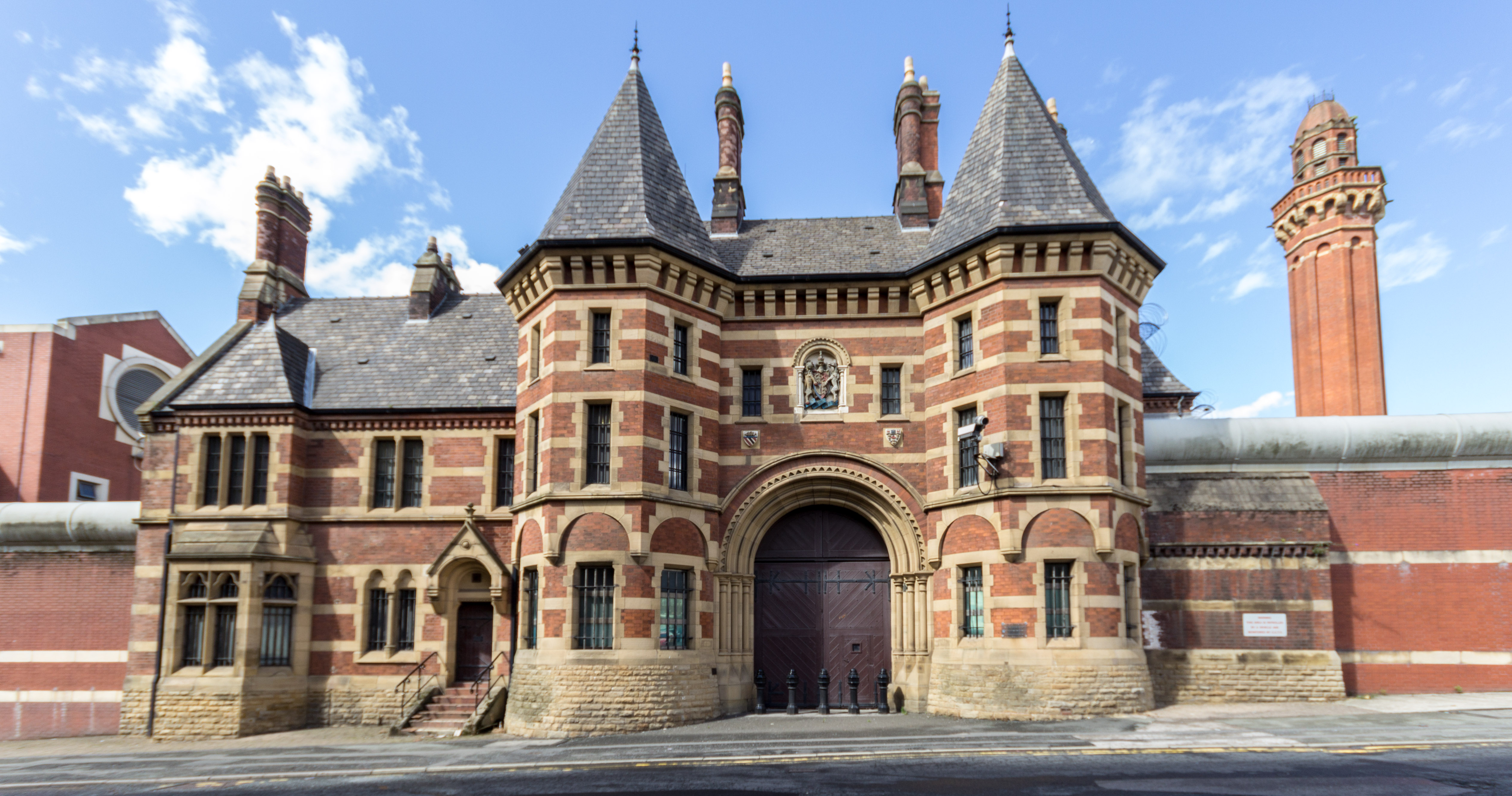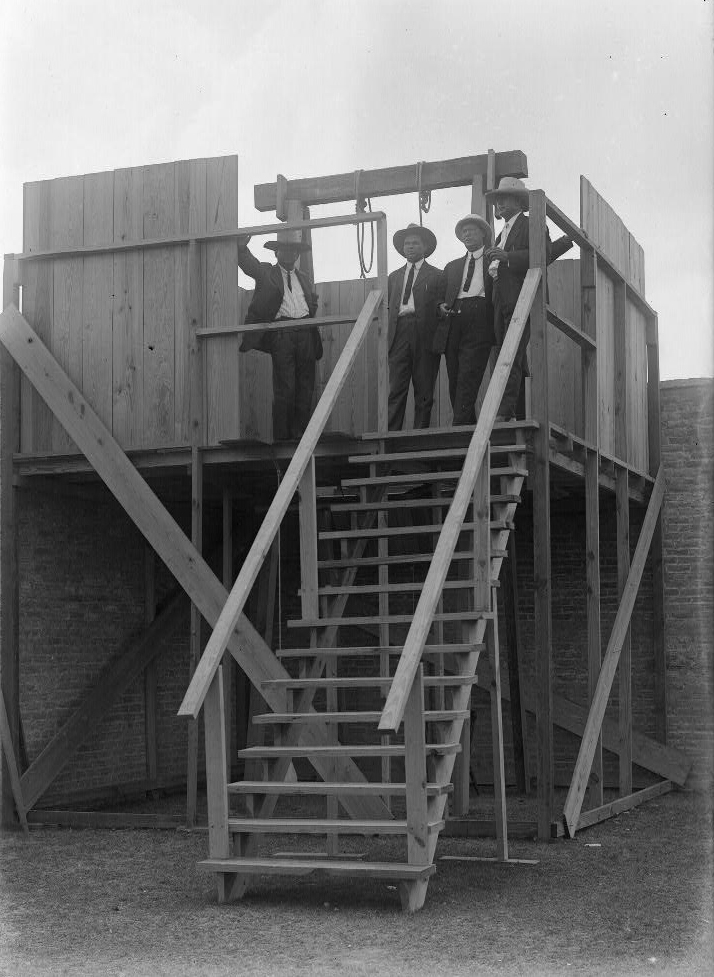|
James Smith (murderer)
James Smith (1936 – 28 November 1962) was the sixth-to-last criminal to be executed in a British prison. He was hanged for the murder of Sarah Isabella Cross in her sweetshop at the corner of Hulme Hall Lane and Iron Street, Miles Platting, Manchester. Smith, born in Edinburgh in 1936, had entered the shop on Friday 4 May 1962 and battered 58-year-old Cross to death in order to rob her of around £6 from the till. A total of 5 glass screw-top orangeade and cherryade bottles (made by Wild Bros of Heywood) were used to club the victim, each of which shattered to pieces as a result. Smith left coins scattered on the shop floor as he made his escape through the rear exit. The victim's body was subsequently found lying behind the counter. Forensic experts discovered Smith's fingerprint on a door frame which had been painted two days earlier by Cross's husband, a factory worker, and was still slightly tacky. Smith's fingerprints were already on file because of a previous convict ... [...More Info...] [...Related Items...] OR: [Wikipedia] [Google] [Baidu] |
Homicide Act 1957
The Homicide Act 1957 (5 & 6 Eliz.2 c.11) is an Act of the Parliament of the United Kingdom. It was enacted as a partial reform of the common law offence of murder in English law by abolishing the doctrine of constructive malice (except in limited circumstances), reforming the partial defence of provocation, and by introducing the partial defences of diminished responsibility and suicide pact. It restricted the use of the death penalty for murder. Similar provisions to Part I of this Act was enacted for Northern Ireland by Part II of the Criminal Justice Act (Northern Ireland) 1966. History The Act was introduced following the Royal Commission on Capital Punishment 1949–53, and embodied some of its recommendations but differed from the main recommendation which was that "it is impracticable to find a satisfactory method of limiting the scope of capital punishment by dividing murder into degrees". During and after the royal commission there had been several controversial ca ... [...More Info...] [...Related Items...] OR: [Wikipedia] [Google] [Baidu] |
Executed British People
Capital punishment, also known as the death penalty, is the state-sanctioned practice of deliberately killing a person as a punishment for an actual or supposed crime, usually following an authorized, rule-governed process to conclude that the person is responsible for violating norms that warrant said punishment. The sentence ordering that an offender is to be punished in such a manner is known as a death sentence, and the act of carrying out the sentence is known as an execution. A prisoner who has been sentenced to death and awaits execution is ''condemned'' and is commonly referred to as being "on death row". Crimes that are punishable by death are known as ''capital crimes'', ''capital offences'', or ''capital felonies'', and vary depending on the jurisdiction, but commonly include serious crimes against the person, such as murder, mass murder, aggravated cases of rape (often including child sexual abuse), terrorism, aircraft hijacking, war crimes, crimes against hum ... [...More Info...] [...Related Items...] OR: [Wikipedia] [Google] [Baidu] |
1962 Deaths
Year 196 ( CXCVI) was a leap year starting on Thursday (link will display the full calendar) of the Julian calendar. At the time, it was known as the Year of the Consulship of Dexter and Messalla (or, less frequently, year 949 ''Ab urbe condita''). The denomination 196 for this year has been used since the early medieval period, when the Anno Domini calendar era became the prevalent method in Europe for naming years. Events By place Roman Empire * Emperor Septimius Severus attempts to assassinate Clodius Albinus but fails, causing Albinus to retaliate militarily. * Emperor Septimius Severus captures and sacks Byzantium; the city is rebuilt and regains its previous prosperity. * In order to assure the support of the Roman legion in Germany on his march to Rome, Clodius Albinus is declared Augustus by his army while crossing Gaul. * Hadrian's wall in Britain is partially destroyed. China * First year of the '' Jian'an era of the Chinese Han Dynasty. * Emperor Xian of ... [...More Info...] [...Related Items...] OR: [Wikipedia] [Google] [Baidu] |
1936 Births
Events January–February * January 20 – George V of the United Kingdom and the British Dominions and Emperor of India, dies at his Sandringham Estate. The Prince of Wales succeeds to the throne of the United Kingdom as King Edward VIII. * January 28 – Britain's King George V state funeral takes place in London and Windsor. He is buried at St George's Chapel, Windsor Castle * February 4 – Radium E (bismuth-210) becomes the first radioactive element to be made synthetically. * February 6 – The 1936 Winter Olympics, IV Olympic Winter Games open in Garmisch-Partenkirchen, Germany. * February 10–February 19, 19 – Second Italo-Ethiopian War: Battle of Amba Aradam – Italian forces gain a decisive tactical victory, effectively neutralizing the army of the Ethiopian Empire. * February 16 – 1936 Spanish general election: The left-wing Popular Front (Spain), Popular Front coalition takes a majority. * February 26 – February 26 Inci ... [...More Info...] [...Related Items...] OR: [Wikipedia] [Google] [Baidu] |
Burial
Burial, also known as interment or inhumation, is a method of final disposition whereby a dead body is placed into the ground, sometimes with objects. This is usually accomplished by excavating a pit or trench, placing the deceased and objects in it, and covering it over. A funeral is a ceremony that accompanies the final disposition. Humans have been burying their dead since shortly after the origin of the species. Burial is often seen as indicating respect for the dead. It has been used to prevent the odor of decay, to give family members closure and prevent them from witnessing the decomposition of their loved ones, and in many cultures it has been seen as a necessary step for the deceased to enter the afterlife or to give back to the cycle of life. Methods of burial may be heavily ritualized and can include natural burial (sometimes called "green burial"); embalming or mummification; and the use of containers for the dead, such as shrouds, coffins, grave liners, and ... [...More Info...] [...Related Items...] OR: [Wikipedia] [Google] [Baidu] |
Harry Allen (executioner)
Harry Bernard Allen (5 November 1911 – 14 August 1992) was one of Britain's last official executioners, officiating between 1941 and 1964. He was chief executioner at 41 executions and acted as assistant executioner at 53 others, at various prisons in England, Scotland, Northern Ireland, the Channel Islands and Cyprus. He acted as assistant executioner for 14 years, mostly to Albert Pierrepoint from 1941 to 1955. In October 1955 Allen was appointed as Chief Executioner alongside Pierrepoint, although he did not execute anyone in this role until 10 May 1956, when he hanged two EOKA members in Cyprus. Pierrepoint was no longer available because he had resigned in February 1956. Allen's most controversial hanging came in April 1962, when James Hanratty was hanged for murder, despite efforts to clear his name. Hanratty was proven guilty in 2002 by DNA. Allen also assisted in the execution of Derek Bentley in 1953, and he performed one of the last two executions in Britain, in ... [...More Info...] [...Related Items...] OR: [Wikipedia] [Google] [Baidu] |
Manchester (HM Prison)
HM Prison Manchester is a Category A and B men's prison in Manchester, England, operated by His Majesty's Prison Service. It is still commonly referred to as Strangeways, which was its former official name derived from the area in which it is located, until it was rebuilt following a major riot in 1990. It is a local prison, holding prisoners remanded into custody from courts in the Manchester area and Category A prisoners (those held under maximum security conditions). The prison featured an execution chamber prior to the abolition of capital punishment in the United Kingdom in the 1960s; the last execution at the prison took place in 1964. Strangeways was designed by Alfred Waterhouse and opened in 1868 alongside the demolished Manchester Assize Courts. The prison is known for its prominent ventilation tower and imposing design, structured by the principles of the separate system. History Construction of the Grade II listed prison was completed in 1869, and it was op ... [...More Info...] [...Related Items...] OR: [Wikipedia] [Google] [Baidu] |
Gallows
A gallows (or scaffold) is a frame or elevated beam, typically wooden, from which objects can be suspended (i.e., hung) or "weighed". Gallows were thus widely used to suspend public weighing scales for large and heavy objects such as sacks of grain or minerals, usually positioned in markets or toll gates. The term was also used for a projecting framework from which a ship's anchor might be raised so that it is no longer sitting on the bottom, i.e., "weighing heanchor,” while avoiding striking the ship’s hull. In modern usage it has come to mean almost exclusively a scaffold or gibbet used for execution by hanging. Etymology The term "gallows" was derived from a Proto-Germanic word '' galgô'' that refers to a "pole", "rod" or "tree branch". With the beginning of Christianization, Ulfilas used the term ''galga'' in his Gothic Testament to refer to the cross of Christ, until the use of the Latin term (crux = cross) prevailed. Forms of hanging Gallows can take several f ... [...More Info...] [...Related Items...] OR: [Wikipedia] [Google] [Baidu] |
Failsworth
Failsworth is a town in the Metropolitan Borough of Oldham in Greater Manchester, England, north-east of Manchester city centre and south-west of Oldham. The orbital M60 motorway skirts it to the east. The population at the 2011 census was 20,680. Historically in Lancashire, Failsworth until the 19th century was a farming township linked ecclesiastically with Manchester. Inhabitants supplemented their farming income with domestic hand-loom weaving. The humid climate and abundant labour and coal led to weaving of textiles as a Lancashire Mill Town with redbrick cotton mills. A current landmark is the Failsworth Pole. Daisy Nook is a country park on the southern edge. Etymology Failsworth derives from the Old English and ''worth'', probably meaning an "enclosure with a special kind of fence". History Early settlement rested on a road that runs today between Manchester and Yorkshire. This Roman secondary road formed part of a network from Manchester up north, probably to Ta ... [...More Info...] [...Related Items...] OR: [Wikipedia] [Google] [Baidu] |





